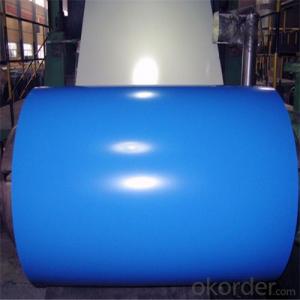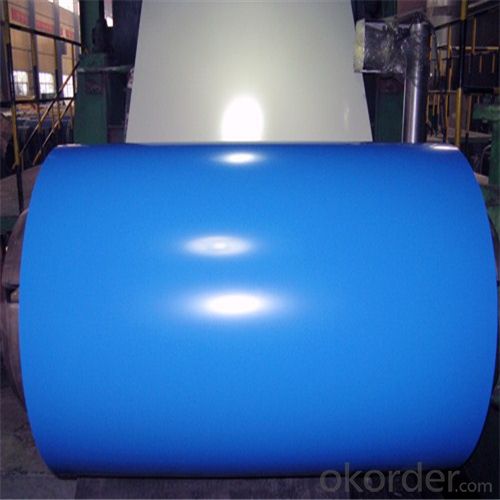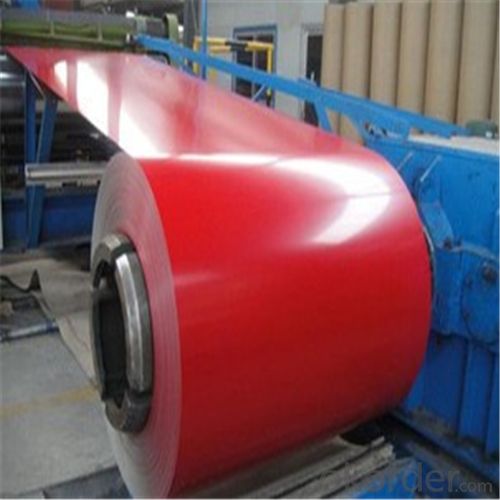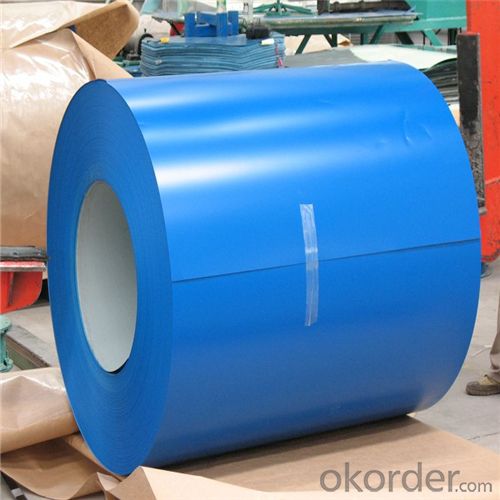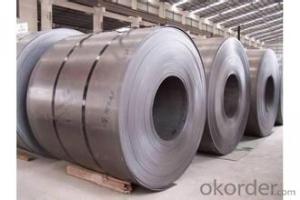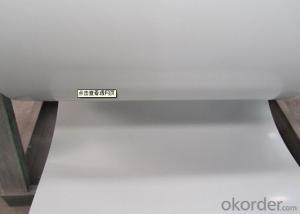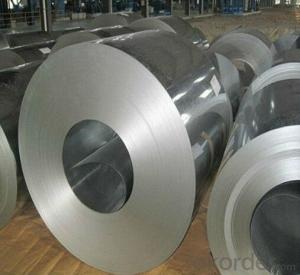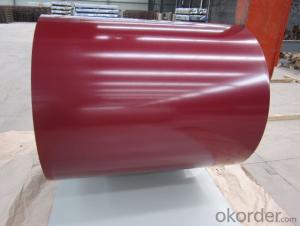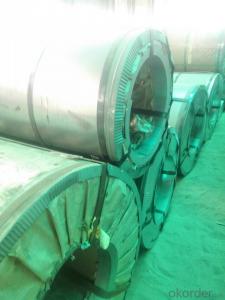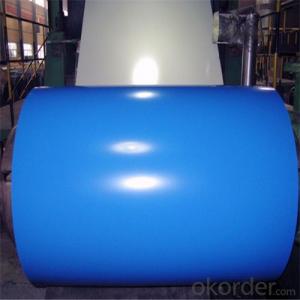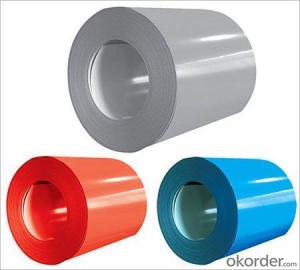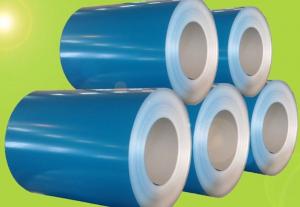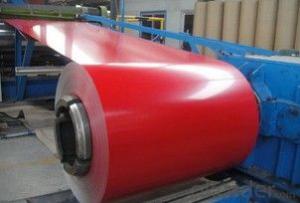Pre-painted Galvanized Steel Coil Used for Industry with the Attractive Good Price
- Loading Port:
- Shanghai
- Payment Terms:
- TT OR LC
- Min Order Qty:
- 25 m.t.
- Supply Capability:
- 5000 m.t./month
OKorder Service Pledge
OKorder Financial Service
You Might Also Like
Pre-painted Galvanized Steel Coil Used for Industry
1.Structure of Pre-painted Galvanized Steel Coil Description
With GI as base metal, after pretreatement and liquid dope with several layers of color, then after firing and cooling, finally the plate steel is called pre-painted galvanized steel. Pre-painted galvanized steel is good capable of decoration, molding, corrosion resistance. It generally displays superior workability, durability and weather resistance.
2.Main Features of Pre-painted Galvanized Steel Coil
•High Purity
•Easy control and operation
•High strength
•Fast melting
•Competitive price
•Best Service
3. Pre-painted Galvanized Steel Coil Images
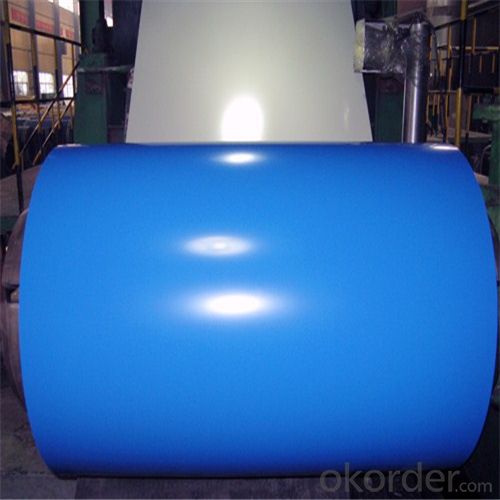
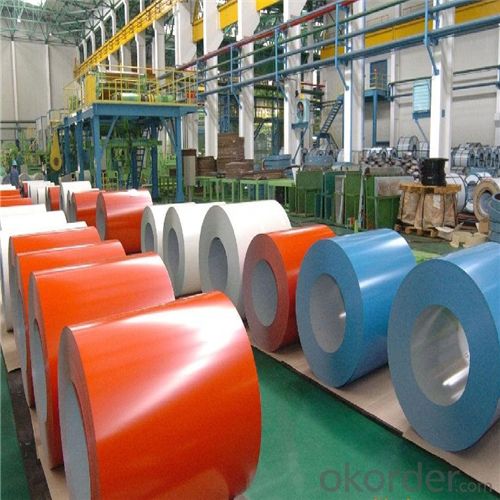
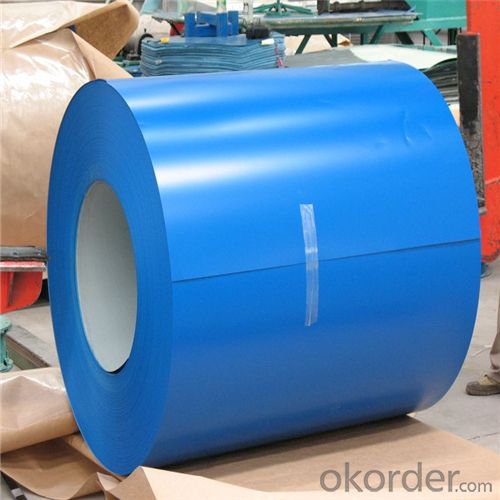
4. Pre-painted Galvanized Steel Coil Specification
Pre-painted Galvanized Steel Coil | |
Thicknenss | 0.18mm-1.5mm |
Width | 900-1250mm |
Coating mass | 30-275g/㎡ |
Paint | PE, PVDF, PU |
Color | RAL Scale |
Coil weight | 3-7mt |
Coil inner diameter | 508 or 610mm |
5.FAQ of Hot-Dip Galvanized Steel Coil
We have organized several common questions for our clients,may help you sincerely:
①How about your company?
A world class manufacturer & supplier of castings forging in carbon steel and alloy steel,is one of the large-scale professional investment casting production bases in China,consisting of both casting foundry forging and machining factory. Annually more than 8000 tons Precision casting and forging parts are exported to markets in Europe,America and Japan. OEM casting and forging service available according to customer’s requirements.
②How to guarantee the quality of the products?
We have established the international advanced quality management system,every link from raw material to final product we have strict quality test;We resolutely put an end to unqualified products flowing into the market. At the same time, we will provide necessary follow-up service assurance.
③How long can we receive the product after purchase?
In the purchase of product within three working days, We will arrange the factory delivery as soon as possible. The pecific time of receiving is related to the state and position of customers.Commonly 7 to 10 working days can be served.
- Q: How are steel coils used in the production of agricultural equipment?
- Steel coils are used in the production of agricultural equipment as they are rolled and shaped to create various components like frames, brackets, and panels. These components provide strength, durability, and structural integrity to the equipment, ensuring it can withstand the demanding conditions of agricultural operations.
- Q: How does the surface finish of steel coils affect their performance?
- The surface finish of steel coils plays a significant role in determining their performance. A smooth and uniform surface finish enhances the coil's ability to resist corrosion, improves its aesthetic appeal, and allows for easier cleaning and maintenance. It also facilitates better adhesion of coatings or finishes, which can enhance the coil's durability and protect it from environmental factors. On the other hand, a rough or uneven surface finish may compromise the coil's performance by promoting corrosion, reducing its ability to withstand wear and tear, and potentially impairing its functionality in certain applications. Therefore, the surface finish of steel coils is a critical factor that directly impacts their overall performance and longevity.
- Q: What are the different methods of coil leveling?
- There are several methods of coil leveling that are commonly used in various industries. These methods include: 1. Roller leveling: This method involves passing the coil through a series of rollers that apply pressure and gradually flatten the coil. The rollers can be adjusted to apply varying levels of pressure, allowing for precise control over the leveling process. 2. Stretch leveling: In this method, the coil is subjected to tension forces that elongate the material and remove the internal stresses. The coil is passed through a series of rollers while being stretched, which results in a more uniform and flat surface. 3. Temper leveling: This method involves heating the coil to a specific temperature and then cooling it rapidly. The rapid cooling process helps to equalize the stresses within the coil and improve its flatness. Temper leveling is often used for high-strength steels. 4. Roller leveling with leveling rolls: This method uses additional leveling rolls that are positioned above and below the main leveling rollers. The leveling rolls apply pressure to specific areas of the coil to correct any unevenness or distortions. 5. Tension leveling: This method involves applying tension to the coil while it is being processed. The tension helps to straighten and flatten the material, resulting in a more even and flat surface. 6. Precision leveling: This method is used for high-precision applications where extremely flat and uniform coils are required. Precision leveling involves a combination of roller leveling, stretch leveling, and other corrective measures to achieve the desired level of flatness. Each of these methods has its own advantages and limitations, and the choice of method depends on factors such as the type of material being leveled, the required flatness tolerance, and the intended application of the coil.
- Q: How are steel coils used in the marine industry?
- Steel coils are commonly used in the marine industry for various applications such as shipbuilding, offshore drilling platforms, and marine infrastructure. These coils are used to manufacture hull structures, decks, bulkheads, and other components, providing strength and durability needed to withstand harsh marine environments. Additionally, steel coils are also utilized in the production of marine equipment and machinery, ensuring the reliability and performance of marine vessels and structures.
- Q: So...that means Wolverine can stab him, right? Because Adamantite is stronger than steel. Correct?
- I don't think Wolverine could stab Superman. The name Man of Steel is just a nickname that was acquired through the years. Just like Superman is able to fly, but when the initial comic came out, he could only, leap tall buildings with a single bound, and is stronger than a locomotive. Of course, now he can fly and is MUCH more stronger than a train! hahahahah. So even though Wolverine is cool, I hardly doubt he could stab Superman...not that he would of course. =)
- Q: How are steel coils protected from corrosion?
- Steel coils are typically protected from corrosion through a process called galvanization, where a layer of zinc is applied to the surface of the steel. This zinc coating acts as a sacrificial barrier, preventing the steel from coming into direct contact with moisture and oxygen, which are the primary causes of corrosion. Additionally, steel coils can also be protected through the application of protective coatings or by storing them in a controlled environment to minimize exposure to corrosive elements.
- Q: What are the common coil packaging methods?
- The common coil packaging methods include stretch wrapping, strapping, banding, and using coil covers.
- Q: I'm in the middle of a remodel and buying appliances. Is there any way to ensure that the stainless steel is the same tone if you get different brands?
- Stainless steel is pretty much stainless steel. The differences in tone you can get is when you get stainless steel look appliances. They tend to be a bit more like a charcoal color than true stainless steel color. When I bought my house, it had a stainless steel GE microwave, dishwasher, and stove, and a Braun stainless steel range hood. When we remodeled last year, we got a Maytag Ice20 stainless steel refrigerator and a Kholer stainless steel sink. They all look fine together.
- Q: like the steel industry and the effects it had on industrial growth, 10 points!
- The single most important important advance in steel production was learning to accurately control carbon content. This was done through the Bessemer Process in which air was blown through molten iron to burn out impurities and excess carbon. Low carbon iron (wrought iron) could be easily worked into shapes. Medium carbon iron could be cast into useful and durable shapes. High carbon steel could be used for structural uses (beams and girders). Adding alloys such as nickel and silicon could produce very tough steels and steels resistant to rust. Adding vanadium to steel engine parts allowed Ford to produce finely machined engines in huge numbers with existing machinery.
- Q: How are steel coils used in the production of steel chains?
- Steel coils are used in the production of steel chains by being unwound and fed into a machine that shapes and forms the individual links of the chain. The steel coils provide the raw material needed to create the strong and durable chains, ensuring they have the necessary strength and integrity for various applications.
Send your message to us
Pre-painted Galvanized Steel Coil Used for Industry with the Attractive Good Price
- Loading Port:
- Shanghai
- Payment Terms:
- TT OR LC
- Min Order Qty:
- 25 m.t.
- Supply Capability:
- 5000 m.t./month
OKorder Service Pledge
OKorder Financial Service
Similar products
Hot products
Hot Searches
Related keywords
